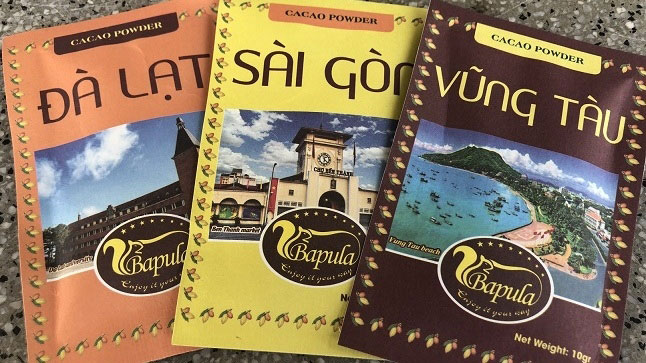
Amazon Foods Co., Ltd. put into operation a factory to produce cacao powder and chocolate candies of the brand Bapula in Tan Hai commune, Phu My town, Ba Ria-Vung Tau province, on August 5.

Cacao powder of the brand Bapula
According
to Ho Si Bao, Director of the company, the factory covers an area of 700 metres
square, using a production line of Belgian technology with a capacity of
roughly 1 tonnes per month.
The main source of cacao for chocolate
production is purchased by farmers in Chau Duc district with an area of about
800 hectares, as well as from the Bapula Ba Ria cocoa cooperative, in Chau Duc
district, with an area more than 100 hectares. Cacao cultivation and care
practices in the cooperative comply with the organic production standard.
The factory offers products such as cacao
beans, cacao powder, chocolate candies such as chocolate with 68% cacao,
chocolate with 72% cacao, chocolate candy with sticky cacao and peanut; Cacao
powder 3 in 1, and cacao wine.
In addition, a stopover for visitors was built
on the grounds of the factory. Visitors will have a chance to visit and
experience the process of making chocolate.
Source: NDO
Preserving and promoting the cultural values of the Muong ethnic group has become an urgent task in the current context, as many traditional values face the risk of fading away. This effort requires not only protecting the cultural identity but also eliminating outdated customs and developing a modern cultural lifestyle, contributing to sustainable values for the Muong community in Hoa Binh province.
The Muong ethnic culture, deeply rooted in Vietnam’s mountainous north, continues to be preserved and revitalised by dedicated individuals and communities determined to safeguard their ancestral identity.
The Muong group is one of the largest ethnic minorities in Vietnam, primarily found in Hoa Binh province. The Muong people in Hoa Binh boast a rich and diverse cultural treasure that reflects the unique identity of this ethnic group. Accounting for over 63% of the province's population, they have created and preserved numerous distinctive cultural values, contributing to their unique identity. Their cultural heritage is an invaluable asset, at the heart of their national identity, and represents a vibrant spiritual life that must be preserved and promoted in today’s modern world.
For generations, the ethnic communities of Hoa Binh province, particularly the Muong people, have preserved vibrant festivals deeply intertwined with the region’s geography, nature, and social traditions. These celebrations enrich Hoa Binh’s spiritual life and cultural identity, reflecting both folk beliefs and the intermingling of ethnic customs. Many of these festivals have endured the test of time, passed down through generations and continuing to thrive today. Among them, the Khai Ha (Going Down to the Field) festival stands out as one of the most significant events of the Muong ethnic group.
Muong calendar, known as sach doi, is an ancient folk knowledge system developed through observations of the movement of the pleiades star. This unique calendar consists of 12 bamboo sticks, each representing a lunar month. Specific days within each month are marked with distinct symbols, guiding locals in determining auspicious and inauspicious days for important activities.
Authorities and residents of Chieng Chau commune, Mai Chau district, are making efforts to preserve and promote the historical value of a centuries-old gold apple tree (scientifically known as diospyros decandra lour), which has been recognised as a national heritage tree.



